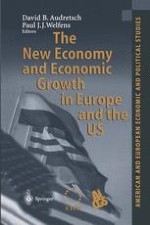2002 | Supplement | Buchkapitel
Integrating Electronic Commerce Into the World Trading System: Issues and Challenges
verfasst von : Harald Sander
Erschienen in: The New Economy and Economic Growth in Europe and the US
Verlag: Springer Berlin Heidelberg
Enthalten in: Professional Book Archive
Aktivieren Sie unsere intelligente Suche, um passende Fachinhalte oder Patente zu finden.
Wählen Sie Textabschnitte aus um mit Künstlicher Intelligenz passenden Patente zu finden. powered by
Markieren Sie Textabschnitte, um KI-gestützt weitere passende Inhalte zu finden. powered by
Electronic commerce has the potential to fulfill the promise of globalization to create a true global marketplace in both, quantitative and qualitative terms. International Data Cooperation has estimated that e-commerce will amount to US$ 2.5 trillion in the year 20041. Since e-commerce is in essence borderless, much of this electronic commerce will result into electronic trade. FORRESTER RESEARCH (2000) argues that in 2004 US$ 1.4 trillion of exports will be traded online, thus constituting about 18% of global exports2. Even if one does not believe fully in such projections — estimates often vary widely — the future quantitative relevance of global e-commerce is undisputed. Moreover, and even more important, the very borderless nature of the Internet may turn e-commerce into the globalizing catalyst of the future world economy for two reasons. First, it has the potential to transcend the stubborn effects of national borders that still restrict international trade below intranational levels. Secondly, the Internet may become the driving force for an increasing fragmentation of global production.
